(reblogged from The Steampunk Workshop)
I’m a librarian by profession, and a scholar by inclination, so when I got involved with the amazing confluence of ideas that was steampunk in mid naughts I naturally wanted to know where this idea of steampunk came from. Most steampunks know little about steampunk’s origins. We are part of a strange phenomenon in which loads of elaborately costumed people call themselves “fans” of books they can’t even name.
This is not too surprising since steampunk didn’t become popular as a genre until after it inspired an art and lifestyle movement. The few histories of the genre are too lengthy for most people to digest, but not knowing the basics about where steampunk came from leaves its enthusiasts wallowing in a shallow puddle of clichés when they could be swimming in an ocean of imagination. As a cure I suggest the reading nine of the most creative works of late twentieth century speculative fiction, the novels that defined steampunk.
The Original Steampunk Novels
A popular idea is that H. G. Wells and Jules Verne were the originators of steampunk. This is not really true. Despite its anachronistic veneer, steampunk is a very contemporary genre expressing contemporary interests and concerns. Wells, Verne, Shelly and others are important sources of inspiration for steampunk but they are not steampunk authors themselves. They wrote in a nineteenth century or nineteen century inspired setting because that’s when they lived. For a modern writer full of current ideas to choose such a setting is a totally different thing. There are isolated examples of writers revisiting Victorian settings throughout sci-fi’s history but steampunk as a word and concept has a clear origin in a letter to the science fiction trade journal Locus published in April 1987.
Dear Locus,
Enclosed is a copy of my 1979 novel Morlock Night; I'd appreciate your being so good as to route it Faren Miller, as it's a prime piece of evidence in the great debate as to who in "the Powers/Blaylock/Jeter fantasy triumvirate" was writing in the "gonzo-historical manner" first. Though of course, I did find her review in the March Locus to be quite flattering.
Personally, I think Victorian fantasies are going to be the next big thing, as long as we can come up with a fitting collective term for Powers, Blaylock and myself. Something based on the appropriate technology of the era; like 'steam-punks', perhaps.
—K.W. Jeter
Jeter’s letter tells us three important things.
1. K. W. Jeter invented the word "steam-punks" to describe authors of "gonzo-historical" "Victorian fantasies"
2. The other two steam-punks were Tim Powers, and James Blaylock.
3. Morlock Night was the earliest of the novels in the newly named genre.
Powers, Blaylock, and Jeter wrote a lot books between them, but of all the novels they wrote by 1987 only four of them were "gonzo-historical" "Victorian fantasies" so the original steampunk genre consisted of only four novels.
Morlock Night by K. W. Jeter, originally published in 1979
There is no clearer illustration of the distinction between steampunk and original Victorian adventure stories than comparing H. G. Wells The Time Machine to Morlock Night. Wells’ novel is a straightforward story about a device that allows one to travel in strictly linear time. It expresses the common modernist idea that technology can do anything but may destroy humanity in the process. In Jeter’s book the Morlocks seize the time machine and invade 19th century London with it. It takes a Victorian premise and mashes it with Arthurian legend and lost technology from Atlantis. More than thirty years after it was written it is still too “experimental,” for many people’s tastes. If read with an open mind you will find an adventure story with some highly imaginative twists. It shows the roots of steampunk as literature that took genre assumptions, smashed them, and made mosaics out of the most interesting bits.
The Anubis Gates by Tim Powers, originally published in 1983
This novel won the Philip K Dick award. It is stunningly well written. The central character is an English professor who travels back to 1810 to attend a lecture given by English poet. When he misses his return trip he must survive in City plagued by a mass murdering Egyptian god and an evil sorcerer clown. The plot snakes around like a serpent in the dark London sewers where so much of the action takes place. What is most surprising is how Powers combines a very hard science fiction approach to time travel with some of the creepiest portrayals of black magic you will find in late twentieth century writing. It’s worth noting that while Jeter grouped this book with his “Victorian fantasies” it is actually set in the last year of the reign George III.
Homunculus by James Blaylock, originally published in 1986
This is the first book about Professor Langdon St Ives and his archenemy the wicked Dr Narbondo. It involves a ghostly dirigible, undead slaves resurrected with fish guts, a stranded space alien and lots of Laphroaig whiskey. Blaylock writes with a dry absurdity that seems very English especially when coupled with his Victorian wording. One of my favorite scenes is when the Trismegistus Club debates what to do while smoking and drinking to the point of incompetence. Not exactly the behavior of heroes but a brilliant satire of the chattering classes.
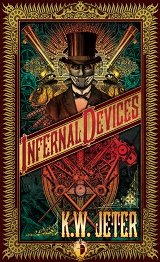 Infernal Devices: A Mad Victorian Fantasy by K. W. Jeter, originally published in 1987
Infernal Devices: A Mad Victorian Fantasy by K. W. Jeter, originally published in 1987Not to be confused with Philip Reeve’s or Cassandra Clare’s later works by the same name. Jeter’s Infernal Devices is one of the funniest steampunk books ever written. The central character, George Dower is a hapless English “every man” character comparable to Arthur Dent in Douglas Adams’ Hitchhiker’s Guide to the Galaxy. All sorts of absurd things happen to Mr. Dower until the madcap plot is tied together with an elaborate dig about Victorian sexual repression. This was the first novel in the genre to heavily feature clockwork technology but there are elements of pure fantasy as well.
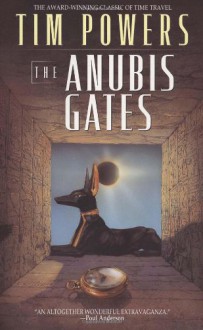 This is a fast-paced and imaginative book that combines quantum mechanics, Egyptian mythology and sorcery, Lord Byron, clown sorcerers, body snatchers, cross dressers, millionaires, doppelgangers (called "ka" in the book), time travel and hints of illegal human medical experimentation . How can you go wrong with that combination? Powers weaves an interesting and fun story with these elements that keeps you on the edge wanting more. The ending has an interesting little twist.
This is a fast-paced and imaginative book that combines quantum mechanics, Egyptian mythology and sorcery, Lord Byron, clown sorcerers, body snatchers, cross dressers, millionaires, doppelgangers (called "ka" in the book), time travel and hints of illegal human medical experimentation . How can you go wrong with that combination? Powers weaves an interesting and fun story with these elements that keeps you on the edge wanting more. The ending has an interesting little twist.

 Log in with Facebook
Log in with Facebook 

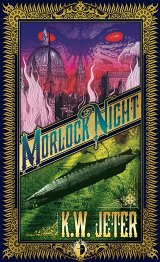
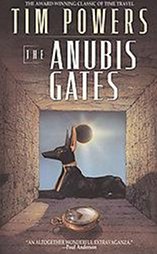
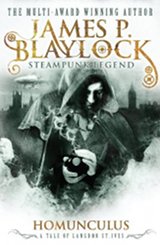
 Infernal Devices: A Mad Victorian Fantasy by K. W. Jeter, originally published in 1987
Infernal Devices: A Mad Victorian Fantasy by K. W. Jeter, originally published in 1987




